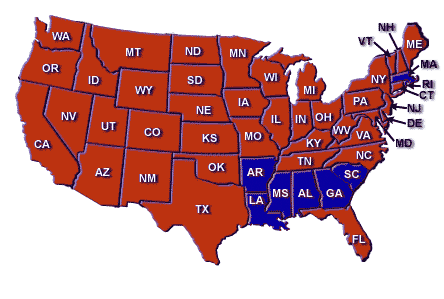In August 1927, incumbent President Calvin Coolidge announced to the nation: "I do not choose to run for president in 1928." That blunt statement opened the doors to a number of Republican hopefuls, but none approached the public esteem enjoyed by Herbert Hoover, the current secretary of commerce and possessor of a long record of humanitarian service. The Republicans assembled in Kansas City the following June and easily nominated Hoover on the first ballot. The vice-presidential nod went to Senator Charles Curtis of Nebraska to soothe feelings of disappointed Midwesterners who backed the presidential ambitions of Frank Lowden, the former governor of Illinois. The platform of 1928 was devoted largely to self-congratulation as the Republicans claimed full credit for the nation`s prosperity and pledged to:
| Election of 1928 Candidates |
Party
|
Electoral
Vote |
Popular
Vote |
| Herbert C. Hoover (Cal.) Charles Curtis (Kansas) |
Republican
|
444
|
21,392,190
|
| Alfred E. Smith (New York) Joseph T. Robinson (Arkansas) |
Democratic
|
87
|
15,016,443
|
| Norman Thomas (New York) James H. Maurer (Pennsylvania) |
Socialist
|
0
|
267,420
|
| William Z. Foster (Illinois) Benjamin Gitlow (New York) |
Workers`
(Communist) |
0
|
48,770
|
| Verne L. Reynolds (Maryland) |
Socialist
Labor |
0
|
21,603
|
| William F. Varney (New York) James A. Edgerton (Washington) |
Prohibition
|
0
|
20,106
|
| Frank E. Webb |
Farmer
Labor |
0
|
6,390
|

|
AL
|
12
|
IL
|
29
|
MN
|
12
|
NC
|
12
|
TX
|
20
|
||||
|
AZ
|
3
|
IN
|
15
|
MS
|
10
|
ND
|
5
|
UT
|
4
|
||||
|
AR
|
9
|
IA
|
13
|
MO
|
18
|
OH
|
24
|
VT
|
4
|
||||
|
CA
|
13
|
KS
|
10
|
MT
|
4
|
OK
|
10
|
VA
|
12
|
||||
|
CO
|
6
|
KY
|
13
|
NE
|
8
|
OR
|
5
|
WA
|
7
|
||||
|
CT
|
7
|
LA
|
10
|
NV
|
3
|
PA
|
38
|
WV
|
8
|
||||
|
DE
|
3
|
ME
|
6
|
NH
|
4
|
RI
|
5
|
WI
|
13
|
||||
|
FL
|
6
|
MD
|
8
|
NJ
|
14
|
SC
|
9
|
WY
|
3
|
||||
|
GA
|
14
|
MA
|
18
|
NM
|
3
|
SD
|
5
|
|
|
||||
|
ID
|
4
|
MI
|
15
|
NY
|
45
|
TN
|
12
|
|
|
|
? 892
|